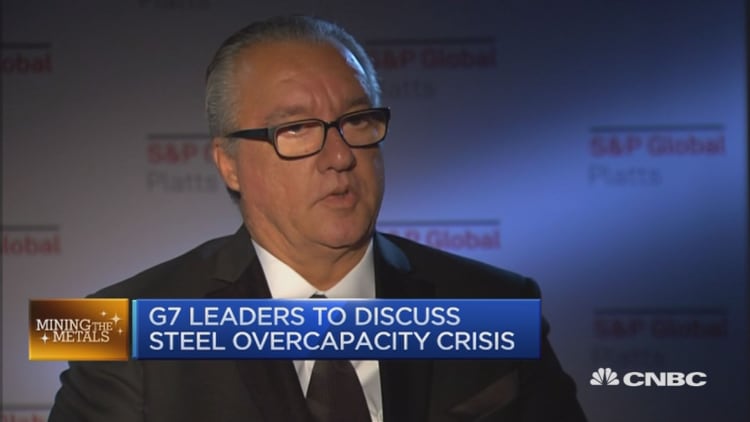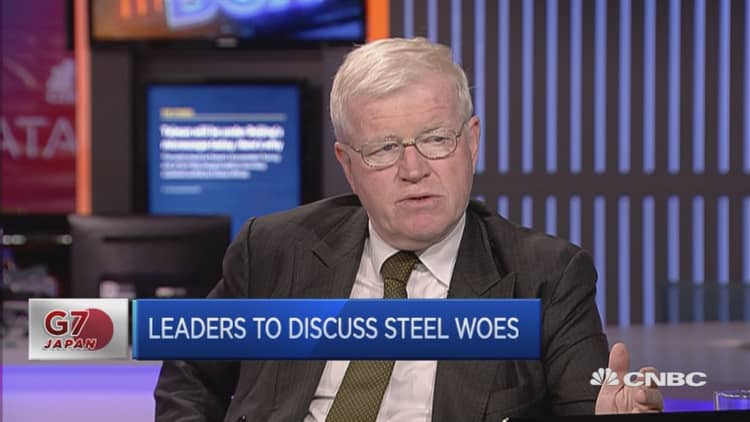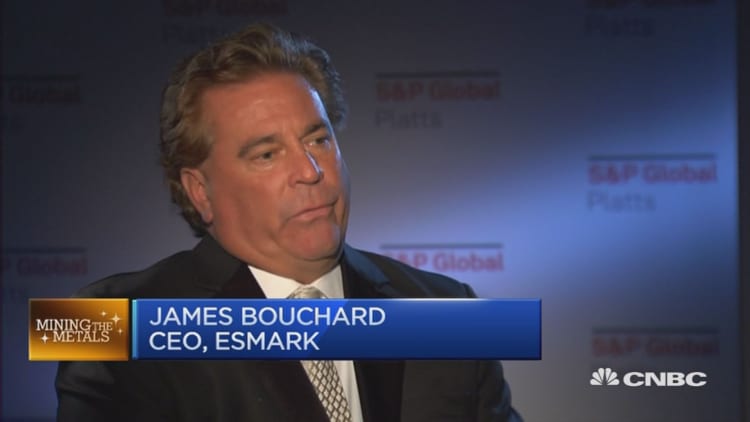


Despite China signaling moves to cut its excess steel production capacity, industry chiefs say the country has declared a metals "war" that has had a "devastating" impact for the rest of the world's industry.
Overcapacity in the steel industry has been a thorn in the side of the sector in recent years, pushing prices down and making it harder for some steel companies to survive.
China's low-cost metal producers have been widely cited as the main culprit for the glut. In particular, the world's second largest economy has been accused of "dumping" cheap steel on to global markets, due to a slowdown in domestic demand, in a bid to gain market share. However Beijing has denied any wrongdoing and has said that its costs are lower than other producers.
Lourenço Gonçalves, chairman, president and chief executive of mining and natural resources company Cliffs Natural Resources, told CNBC on Thursday that China had been acting unfairly.
"China (has not been unfairly targeted). They are the perpetrator, they are the problem and they had a chance to discuss this within the OECD (Organization for Economic Co-operation and Development) and they elected not to participate…China has been walking away from a negotiated deal," he told CNBC on the sidelines of the Platts Global Metals Awards.
It's war, not trade
Other countries, including India, Italy, South Korea and Taiwan, have also been cited as contributing to the global steel glut. Gonçalves said that each country had its own set of subsidies and problems that "create the massive problem of dumping steel in the international market."
Similarly to the oil industry, however, despite a slump in demand, some producers have been slow to cut production in a bid to support prices and in 2015, the OECD forecast that global nominal steelmaking capacity is projected to increase to 2.36 billion tons by 2017, up from 2.16 billion tons in 2013.
In addition, it said that non-OECD economies (such as China) are expected to lead the capacity expansion in the global steel industry, with their share of world capacity expected to increase to 71.4 percent by 2017.
There aren't signs that global steel production is slowing in the immediate term.
While world crude steel production was 385.7 million tons (Mt) in the first three months of 2016, down 3.6 percent compared to the same period in 2015, according to the World Steel Association, China's crude steel production for March 2016 was 70.7 Mt, an increase of 2.9 percent compared to March 2015. India's crude steel production was 8.1 Mt in March 2016, up by 3.4 percent on March 2015.
"Just based on the numbers, China is by far the largest problem," Gonçalves said, accusing China of not abiding by the rules of international trade. "You can't call yourself competitive if your competitiveness is based on cheating the international rules of trade. Trade without fairness is not trade, it's war."
Devastating the industry
The U.S. has tried to counteract the negative impact of cheap Chinese steel by upping its tariffs on imports of cold rolled steel, which is used in car production and construction, from China to 522 percent, saying that China had not cooperated in its investigations into dumping practices.
Read More US raises duties on Chinese steel
The U.K. and European Union have been urged to follow suit but, in comparison, the EU has only a tariff of 16 percent on Chinese cold rolled steel and EU countries are at odds over whether to impose higher import tariffs.
China has responded to the U.S.' tariff hike by saying it would continue with controversial tax rebates to steel exporters that will help to fund a restructuring of its industry and effort to cut steel production capacity by 100 million to 150 million tons by 2020.
James Bouchard, founder, chairman and chief executive of steel services group Esmark, agreed that there was "no doubt about it" that China was dumping steel and said that the impact had been "devastating" for businesses.
"Whatever the lowest price is, whatever any country quotes through their trading companies, the Chinese will just come in and make it a lower price so there doesn't ever seem to be a bottom to the Chinese prices. They'll always take that order and that's had a very aggressive downward pressure on the American pricing," he said, also speaking on the sidelines of the Platts Global Metals Awards on Thursday.
Leaders of the Group of Seven (G7) advanced economies are meeting in Japan next week to discuss what actions can be taken to reduce the steel glut and wider industrial overcapacity. A particular focus will be to look at curbing government subsidies for steel production. Gonçalves also called for more coordinated action on tackling the problem.
"We need to act in a coordinated fashion with other countries," he said. "So far it's only been the U.S. that has been talking and acting and it's very important that we have other countries, especially Japan, the U.K. and Germany, working with us to resolve this massive problem of overcapacity," he said.
Although Bouchard said that action by the G7 could make a difference, he noted that excess capacity had already been "devastating."
"When China has 150 million tons of excess capacity it's been devastating to small manufacturers, small businesses and industrial consumption and might across the world."




